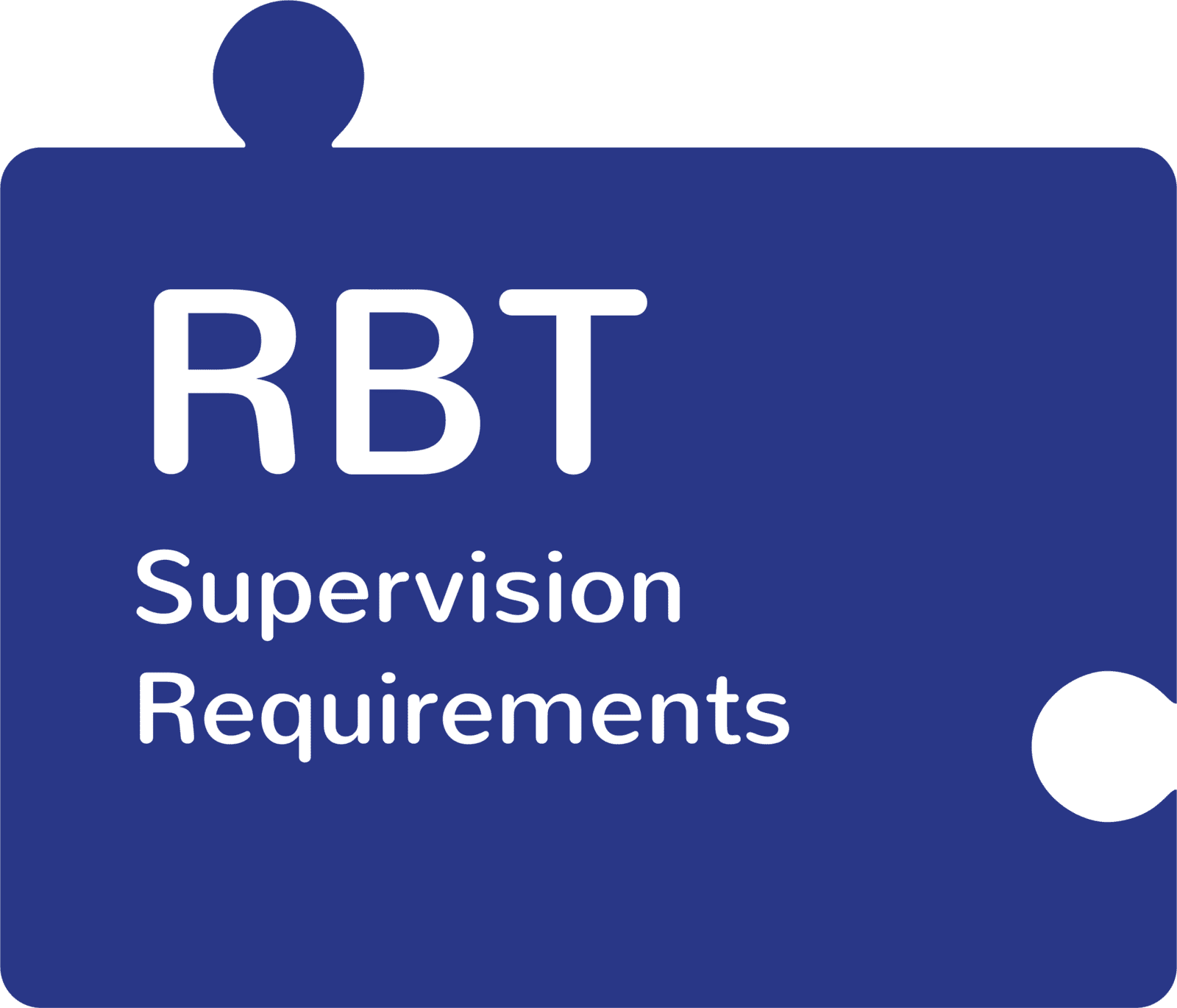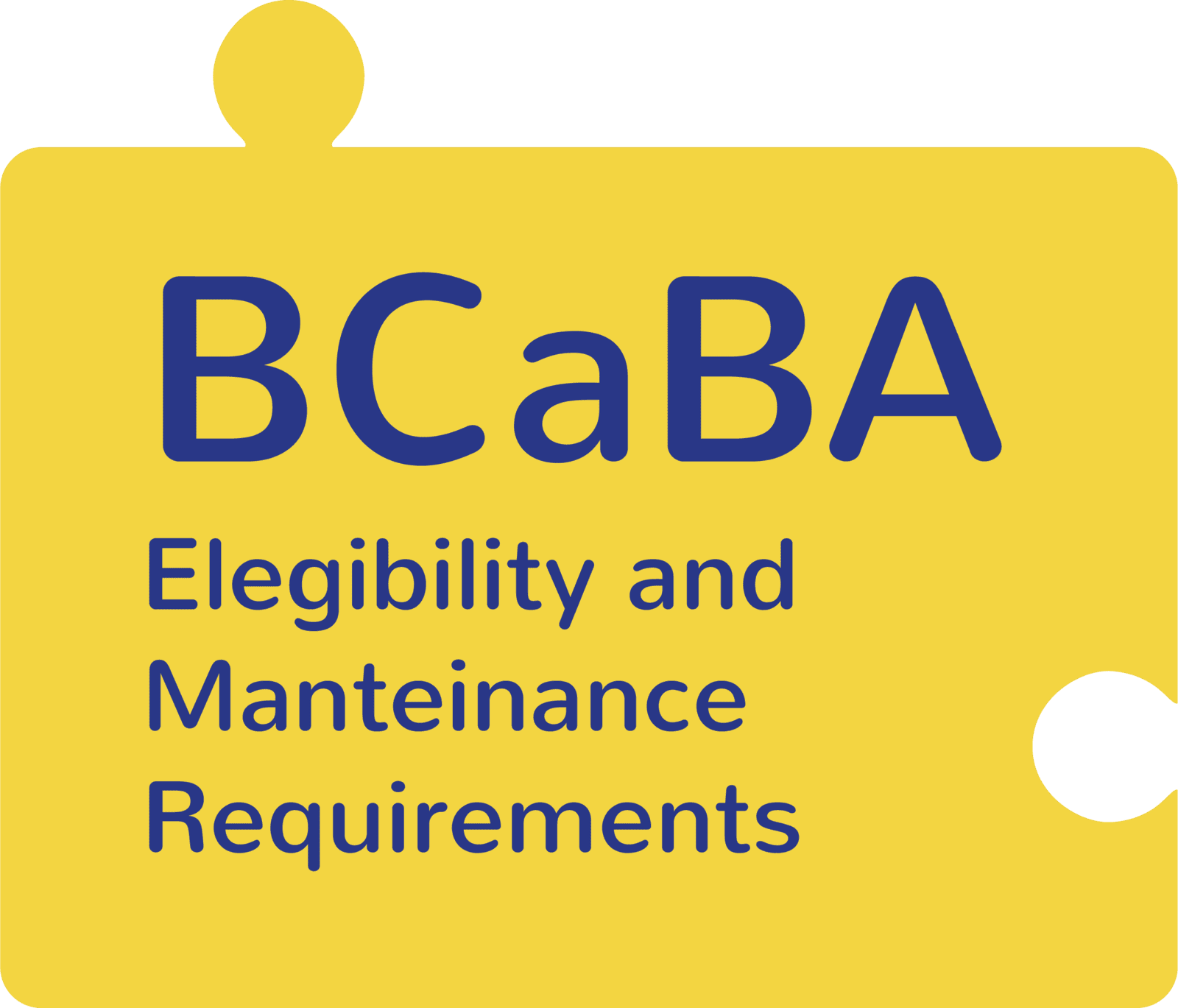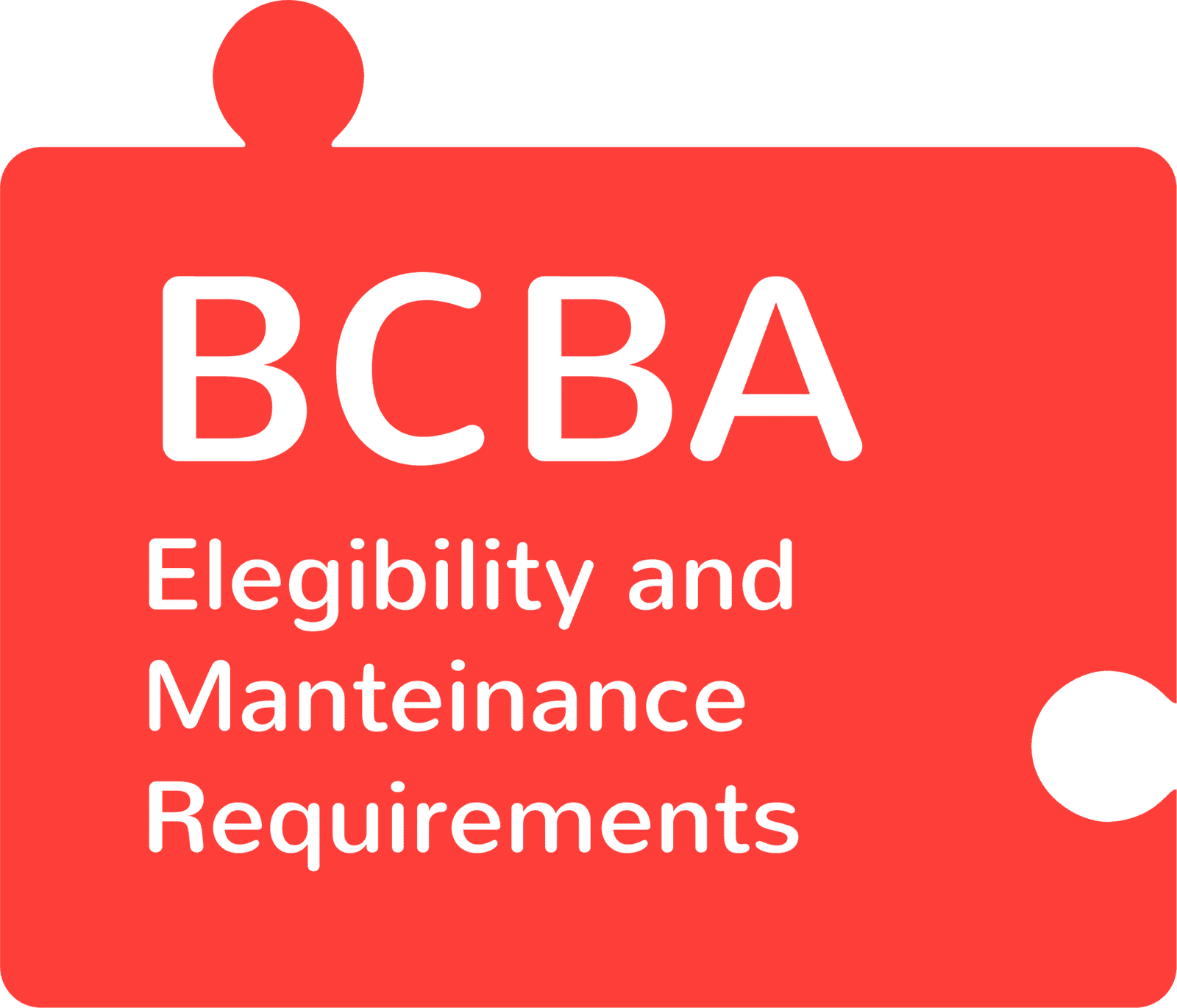BACB
Supervision
Requirements

BACB
Supervision
Requirements

The BACB has stringent requirements that must be met to achieve certifications. In addition to completion of courses, candidates must receive a substantial amount of supervised experience completed by qualified BCBA and/or BCaBA supervisors. The quality of that supervision impacts your ability to develop the skills you need to excel in the field.

As an RBT, you must practice under the close, ongoing supervision of a qualified RBT Supervisor and/or RBT Requirements Coordinator who are responsible for the work you perform. The purpose of ongoing supervision is to improve and maintain your behavior-analytic, professional, and ethical repertoires, and facilitate the delivery of high-quality services to clients.
- Developing performance expectations.
- Observing, providing behavioral skills training, and delivering performance feedback.
- Modeling technical, professional, and ethical behavior.
- Guiding the development of problem-solving and ethical decision-making repertoires.
- Reviewing written materials (e.g., daily progress notes, data sheets).
- Overseeing and evaluating the effects of behavior-analytic service delivery.
- Providing ongoing evaluation of the effects of supervision.
- Must include at least two face-to-face, real-time contacts per month (i.e., supervision may not occur over the phone or via email).
- Your supervisor must observe you providing services in at least one of the monthly meetings.
- In-person, on-site observation is preferred. However, these may be conducted via web cameras, video-conferencing, or similar means instead of your supervisor being physically present.
- At least one of the two supervision sessions must be individual (i.e., with only you and your supervisor), but the other may occur in a small-group meeting (2-10 RBTs).
Notes from BCaBA 2022 Elegibility Requirements and BCaBA Handbook
If you are interested in pursuing BCaBA certification, you must meet the eligibility requirements described below, so you demostrate, along With the examination, that you meet the standards of practice as an assistant behavior analyst. In addition, manteinance requirenents assure that BCaBA certificants engage in activities that will expand their behavior-analytic skills beyond the requirements for initial certification and help them stay up to date on developments in the profession.

Overview of Eligibility Pathways
| Pathway 1: ABAI-Accredited Degree | Pathway 2: Behavior-Analytic Coursework | |
| Degree | Degree from ABAI | Undergraduate degree |
| Content | Accredited bachelor’s program | Behavior-analytic coursework |
| FiedlWork | Practical fieldwork in applied behavior analysis | Practical fieldwork in applied behavior analysis |
Overview of Fieldwork Requirements
| Supervised Fieldwork | Concentrated Supervised | |
| Fieldwork hours required to qualify | 1,300 | 1,000 |
| Supervisor qualifications | Supervisors must be one of the following:
|
| Supervision hours persupervisory period | 5% of hours | 10% of hours |
Total Fieldwork Hours Required:
Based on the type of fieldwork hours accrued, you will need to complete either 1,300 Supervised Fieldwork hours or 1,000 Concentrated Supervised Fieldwork hours to meet the fieldwork requirement.
Onset of Fieldwork: Trainees may not start accumulating fieldwork hours until they have:
- a secured a qualified supervisor AND
- started qualifying undergraduate-level behavior-analytic coursework (they may begin accruing hours after attending the first class meeting).
Accrual of Fieldwork:
No fewer than 20 hours but no more than 130 hours of fieldwork requirements may be accrued per month. Fieldwork hours include independent hours (supervisor not present) and supervised hours (supervisor present).
Duration of Fieldwork:
Acceptable Activities:
The trainee’s primary focus should be on acquiring the skills necessary to demonstrate competence in behavior analysis and the skills necessary to interact effectively with consumers, supervisors, families, and others. The supervisor will be responsible for determining whether activities qualify for accruing fieldwork hours and are consistent with the requirements in this document.
Trainees are strongly encouraged to have multiple experiences with multiple supervisors from each of these areas of activity:
- Conducting assessments related to the need for behavioral intervention (e.g., stimulus preference assessment, functional assessment, staff performance assessment) or for evaluating behavioral interventions.
- Designing, implementing, and systematically monitoring skill-acquisition and behaviorreduction programs writing behavior plans, progress summariesclinical notes, transition summaries, and professional correspondence.
Overseeing the implementation of behavior-analytic programs by others.
Training others, designing behavioral systems, and performance management.
Communicating and collaborating effectively with caregivers and other professionals.
Other activities normally performed by a behavior analyst that are directly related to behavior analysis, such as attending planning meetings regarding the behavior-analytic program and researching the literature that is relevant to a current client’s programming.
Restricted Activities:
There is a restriction on the overall amount of hours you may spend delivering therapeutic and instructional procedures during fieldwork. This restriction is designed to ensure that trainees have sufficient time to acquire the other skills necessary for practice as a BCaBA. Restricted activities may comprise no more than 60% of the total fieldwork hours.
Unrestricted Activities:
Activities that are unrestricted are those that are most likely to be performed by a BCaBA. Unrestricted activities must comprise at least 40% of the total fieldwork hours—this requirement does not need to be met during each supervisory period. Examples of unrestricted activities include:
Observation and data collection training staff and caregivers on behavior-analytic programs or content.
Conducting assessments related to the need for behavioral intervention.
Meeting with clients about behavior-analytic programming and services.
Conducting behavior-analytic assessments (e.g., functional analyses, stimulus preference assessments).
Data graphing and analysis.
Researching the literature relevant to a current client’s programming.
Writing and revising behavior-analytic programs.
Structure of Supervision:
Supervision contacts should ideally consist of individual (i.e., one-onone) contacts between the supervisor and trainee; however, group supervision is permitted in certain circumstances.
To maintain your BCaBA certification, you must obtain ongoing continuing education (CE), adhere to the BACB’s ethics requirements and self-reporting requirements , meet ongoing supervisión requirements, and submit a completed recertification application and associated fees every two years before your recertification date.
CEU Requirements:
As a BCaBA, you are required to obtain 20 continuing education units (CEUs) within each 2-year recertification cycle, including 4 CEUs in ethics and 3 CEUs in supervision (for supervisors).
Ethics and Self-Reporting:
You must adhere to the Professional and Ethical Compliance Code for Behavior Analysts and self-reporting requirements. In addition, applicants and certificants must provide the BACB With information that could impact the BACB’s ability to effectively communicate with them or influence their certification status.
Ongoing Supervision:
Every BCaBA must practice under the supervision of a qualified supervisor. Any BCaBA who does not have a qualified supervisor will be considered inactive and may not practice or use their BCaBA certification until they have a supervisor.
- Supervision Requirements:
First 1,000 hours of post-certification practice: Supervision must comprise at least 5% of the total number of behavior-analytic service hours provided per month with no less than 1 hour of supervision every 2 weeks.
Ongoing supervision (after the first 1,000 hours): Supervision must comprise at least 2% of the total behavior-analytic service hours provided per month.
Frequency of Supervision: Each month in which the BCaBA provides behavior-analytic services, the BCaBA and supervisor must meet at least once. In addition, the BCaBA’s supervisor must be available for consultation between supervisory interactions.
Structure of Supervision: Supervision may include (a) a combination of group and individual supervision, (b) multiple supervisors, and (c) multiple observation methods. This section Contains guidance on the posible structural variations.
- Nature of Supervision: Effective behavior-analytic supervision includes:
- Monitoring the skills of the BCaBA as they deliver behavior-analytic services.
- Developing and communicating performance expectations to the BCaBA.
- Conducting behavioral-skills training for the BCaBA.
- Observing the BCaBA’s performance with clients and delivering feedback.
- Modeling technical, professional, and ethical behavior.
- Guiding the development of behavioral case conceptualization and problem-solving and decisionmaking repertoires.problem-solving and decisionmaking repertoires.problem-solving and decisionmaking repertoires.problem-solving and decisionmaking repertoires.problem-solving and decisionmaking repertoires.
- Reviewing the BCaBA’s written materials (e.g., behavior programs, data sheets, reports) and delivering related feedback about the products.sheets, reports) and delivering related feedback about the products.sheets, reports) and delivering related feedback about the products.sheets, reports) and delivering related feedback about the products.sheets, reports) and delivering related feedback about the products.
- Overseeing and evaluating the effects of the BCaBA’s behavior-analytic service delivery.service delivery.service delivery.service delivery.service delivery.
- Evaluating the effects of supervision throughout the experience.
Supervision Documentation: There are three forms of documentation required for BCaBA supervision: the supervision contract, the BCaBA Supervision Meeting Form, and a documentation system. The supervisor and the BCaBA must retain copies of these documents for at least seven years from the date of the last supervisory meeting and, if requested, provide them to the BACB.
Overview of Eligibility Pathways
| Pathway 1: ABAI-Accredited Degree | Pathway 2: Behavior-Analytic Coursework | |
| Degree | Degree from ABAI | Undergraduate degree |
| Content | Accredited bachelor’s program | Behavior-analytic coursework |
| FiedlWork | Practical fieldwork in applied behavior analysis | Practical fieldwork in applied behavior analysis |
Overview of Fieldwork Requirements
| Supervised Fieldwork | Concentrated Supervised | |
| Fieldwork hours required to qualify | 1,300 | 1,000 |
| Supervisor qualifications | Supervisors must be one of the following:
|
| Supervision hours persupervisory period | 5% of hours | 10% of hours |
Total Fieldwork Hours Required:
Based on the type of fieldwork hours accrued, you will need to complete either 1,300 Supervised Fieldwork hours or 1,000 Concentrated Supervised Fieldwork hours to meet the fieldwork requirement.
Onset of Fieldwork: Trainees may not start accumulating fieldwork hours until they have:
- a secured a qualified supervisor AND
- started qualifying undergraduate-level behavior-analytic coursework (they may begin accruing hours after attending the first class meeting).
Accrual of Fieldwork:
No fewer than 20 hours but no more than 130 hours of fieldwork requirements may be accrued per month. Fieldwork hours include independent hours (supervisor not present) and supervised hours (supervisor present).
Duration of Fieldwork:
Acceptable Activities:
The trainee’s primary focus should be on acquiring the skills necessary to demonstrate competence in behavior analysis and the skills necessary to interact effectively with consumers, supervisors, families, and others. The supervisor will be responsible for determining whether activities qualify for accruing fieldwork hours and are consistent with the requirements in this document.
Trainees are strongly encouraged to have multiple experiences with multiple supervisors from each of these areas of activity:
- Conducting assessments related to the need for behavioral intervention (e.g., stimulus preference assessment, functional assessment, staff performance assessment) or for evaluating behavioral interventions.
- Designing, implementing, and systematically monitoring skill-acquisition and behaviorreduction programs writing behavior plans, progress summariesclinical notes, transition summaries, and professional correspondence.
Overseeing the implementation of behavior-analytic programs by others.
Training others, designing behavioral systems, and performance management.
Communicating and collaborating effectively with caregivers and other professionals.
Other activities normally performed by a behavior analyst that are directly related to behavior analysis, such as attending planning meetings regarding the behavior-analytic program and researching the literature that is relevant to a current client’s programming.
Restricted Activities:
There is a restriction on the overall amount of hours you may spend delivering therapeutic and instructional procedures during fieldwork. This restriction is designed to ensure that trainees have sufficient time to acquire the other skills necessary for practice as a BCaBA. Restricted activities may comprise no more than 60% of the total fieldwork hours.
Unrestricted Activities:
Activities that are unrestricted are those that are most likely to be performed by a BCaBA. Unrestricted activities must comprise at least 40% of the total fieldwork hours—this requirement does not need to be met during each supervisory period. Examples of unrestricted activities include:
Observation and data collection training staff and caregivers on behavior-analytic programs or content.
Conducting assessments related to the need for behavioral intervention.
Meeting with clients about behavior-analytic programming and services.
Conducting behavior-analytic assessments (e.g., functional analyses, stimulus preference assessments).
Data graphing and analysis.
Researching the literature relevant to a current client’s programming.
Writing and revising behavior-analytic programs.
Structure of Supervision:
Supervision contacts should ideally consist of individual (i.e., one-onone) contacts between the supervisor and trainee; however, group supervision is permitted in certain circumstances.
To maintain your BCaBA certification, you must obtain ongoing continuing education (CE), adhere to the BACB’s ethics requirements and self-reporting requirements , meet ongoing supervisión requirements, and submit a completed recertification application and associated fees every two years before your recertification date.
CEU Requirements:
As a BCaBA, you are required to obtain 20 continuing education units (CEUs) within each 2-year recertification cycle, including 4 CEUs in ethics and 3 CEUs in supervision (for supervisors).
Ethics and Self-Reporting:
You must adhere to the Professional and Ethical Compliance Code for Behavior Analysts and self-reporting requirements. In addition, applicants and certificants must provide the BACB With information that could impact the BACB’s ability to effectively communicate with them or influence their certification status.
Ongoing Supervision:
Every BCaBA must practice under the supervision of a qualified supervisor. Any BCaBA who does not have a qualified supervisor will be considered inactive and may not practice or use their BCaBA certification until they have a supervisor.
- Supervision Requirements:
First 1,000 hours of post-certification practice: Supervision must comprise at least 5% of the total number of behavior-analytic service hours provided per month with no less than 1 hour of supervision every 2 weeks.
Ongoing supervision (after the first 1,000 hours): Supervision must comprise at least 2% of the total behavior-analytic service hours provided per month.
Frequency of Supervision: Each month in which the BCaBA provides behavior-analytic services, the BCaBA and supervisor must meet at least once. In addition, the BCaBA’s supervisor must be available for consultation between supervisory interactions.
Structure of Supervision: Supervision may include (a) a combination of group and individual supervision, (b) multiple supervisors, and (c) multiple observation methods. This section Contains guidance on the posible structural variations.
- Nature of Supervision: Effective behavior-analytic supervision includes:
- Monitoring the skills of the BCaBA as they deliver behavior-analytic services.
- Developing and communicating performance expectations to the BCaBA.
- Conducting behavioral-skills training for the BCaBA.
- Observing the BCaBA’s performance with clients and delivering feedback.
- Modeling technical, professional, and ethical behavior.
- Guiding the development of behavioral case conceptualization and problem-solving and decisionmaking repertoires.problem-solving and decisionmaking repertoires.problem-solving and decisionmaking repertoires.problem-solving and decisionmaking repertoires.problem-solving and decisionmaking repertoires.
- Reviewing the BCaBA’s written materials (e.g., behavior programs, data sheets, reports) and delivering related feedback about the products.sheets, reports) and delivering related feedback about the products.sheets, reports) and delivering related feedback about the products.sheets, reports) and delivering related feedback about the products.sheets, reports) and delivering related feedback about the products.
- Overseeing and evaluating the effects of the BCaBA’s behavior-analytic service delivery.service delivery.service delivery.service delivery.service delivery.
- Evaluating the effects of supervision throughout the experience.
Supervision Documentation: There are three forms of documentation required for BCaBA supervision: the supervision contract, the BCaBA Supervision Meeting Form, and a documentation system. The supervisor and the BCaBA must retain copies of these documents for at least seven years from the date of the last supervisory meeting and, if requested, provide them to the BACB.

Professionals certified at the BCBA level are independent practitioners who provide behavior-analytic services. BCBAs may supervise the work of Board Certified Assistant Behavior Analysts (BCaBAs), Registered Behavior Technicians (RBTs), and other professionals who implement behavior-analytic services. If you are interested in pursuing BCBA certification, you must meet the eligibility requirements described below, so you demostrate, along with the examination, that you meet the standards of practice as a behavior analyst.
Overview of Eligibility Pathways
Pathway 1: ABAI-Accredited Degree or ABAI Recognized Program | Pathway 2: Behavior-Analytic Coursework | Pathway 3: Faculty Teaching and Research | Pathway 4: Postdoctoral Experience | |
| Degree | Master’s degree or higher from an ABAI-accredited or ABAI-recognized behavior analysis degree program | Graduate degree | Graduate degree | Graduate degree |
| Content | Master’s degree or higher from an ABAI-accredited or ABAI-recognized behavior analysis degree program | Behavior-analytic coursework | Faculty teaching and research | Postdoctoral experience in applied behavior analysis |
| FiedlWork | Practical fieldwork in applied behavior analysis | Practical fieldwork in applied behavior analysis | Practical fieldwork in applied behavior analysis | Practical fieldwork in applied behavior analysis |
Overview of Fieldwork Requirements
| Supervised Fieldwork | Concentrated Supervised | |
| Fieldwork hours required to qualify | 2,000 | 1,500 |
| Supervisor qualifications | Supervisors must be one of the following:
|
| Supervision hours persupervisory period | 5% of hours | 10% of hours |
Total Fieldwork Hours Required:
Based on the type of fieldwork hours accrued, you will need to complete either 2,000 Supervised Fieldwork hours or 1,500 Concentrated Supervised Fieldwork hours to meet the fieldwork requirement.
Onset of Fieldwork:
Trainees may not start accumulating fieldwork hours until they have:
secured a qualified supervisor, AND
developed and signed a supervision contract with each supervisor , AND
if applying under Pathway 1 or 2: started qualifying graduate-level behavior-analytic coursework (they may begin accruing hours after attending the first class meeting*),OR
if applying under Pathway 4: completed 10 years of postdoctoral experience.
Accrual of Fieldwork:
No fewer than 20 hours but no more than 130 hours of fieldwork requirements may be accrued per month. Fieldwork hours include independent hours (supervisor not present) and supervised hours (supervisor present).
Duration of Fieldwork:
Acceptable Activities:
The trainee’s primary focus should be on acquiring the skills necessary to demonstrate competence in behavior analysis and the skills necessary to interact effectively with consumers, supervisors, families, and others. The supervisor will be responsible for determining whether activities qualify for accruing fieldwork hours and are consistent with the requirements in this document.
Trainees are strongly encouraged to have multiple experiences with multiple supervisors from each of these areas of activity:
- Conducting assessments related to the need for behavioral intervention (e.g., stimulus preference assessment, functional assessment, staff performance assessment) or for evaluating behavioral interventions.
- Designing, implementing, and systematically monitoring skill-acquisition and behaviorreduction programs
- Writing behavior plans, progress summariesclinical notes, transition summaries, and professional correspondence.
Overseeing the implementation of behavior-analytic programs by others.
Training others, designing behavioral systems, and performance management.
Communicating and collaborating effectively with caregivers and other professionals.
Other activities normally performed by a behavior analyst that are directly related to behavior analysis, such as attending planning meetings regarding the behavior-analytic program and researching the literature that is relevant to a current client’s programming.
Restricted Activities:
There is a restriction on the overall amount of hours you may spend delivering therapeutic and instructional procedures during fieldwork. This restriction is designed to ensure that trainees have sufficient time to acquire the other skills necessary for practice as a BCBA. Restricted activities may comprise no more than 40% of the total fieldwork hours—this requirement does not need to be met during each supervisory period. Please note that this restriction does not necessarily refer to all time spent working with clients.
Unrestricted Activities:
Activities that are unrestricted are those that are most likely to be performed by a BCBA. Unrestricted activities must comprise at least 60% of the total fieldwork hours—this requirement does not need to be met during each supervisory period. Examples of unrestricted activities include:
Observation and data collection
Training staff and caregivers on behavior-analytic programs or content.
Conducting assessments related to the need for behavioral intervention.
Meeting with clients about behavior-analytic programming and services.
Conducting behavior-analytic assessments (e.g., functional analyses, stimulus preference assessments).
Data graphing and analysis.
Researching the literature relevant to a current client’s programming.
Writing and revising behavior-analytic programs.
Structure of Supervision:
- Supervision contacts should ideally consist of individual (i.e., one-onone) contacts between the supervisor and trainee; however, group supervision is permitted in certain circumstances.
The trainee must be observed working with a client in the natural environment during each supervisory period by at least one supervisor. In-person, on-site observation is preferred. However, the observation may be conducted using asynchronous (e.g., recorded video) or synchronous (e.g., live video conference) formats.
To maintain your BCBA certification, you must obtain ongoing continuing education, adhere to the BACB’s ethics requirements and self-reporting requirements , and submit a completed recertification application and associated fees every two years before your recertification date. As a BCBA, you are required to obtain 32 continuing education units (CEUs) within each 2-year recertification cycle, including 4 CEUs in ethics and 3 CEUs in supervision (for supervisors).
For more details, please refer to BCBA Handbook




